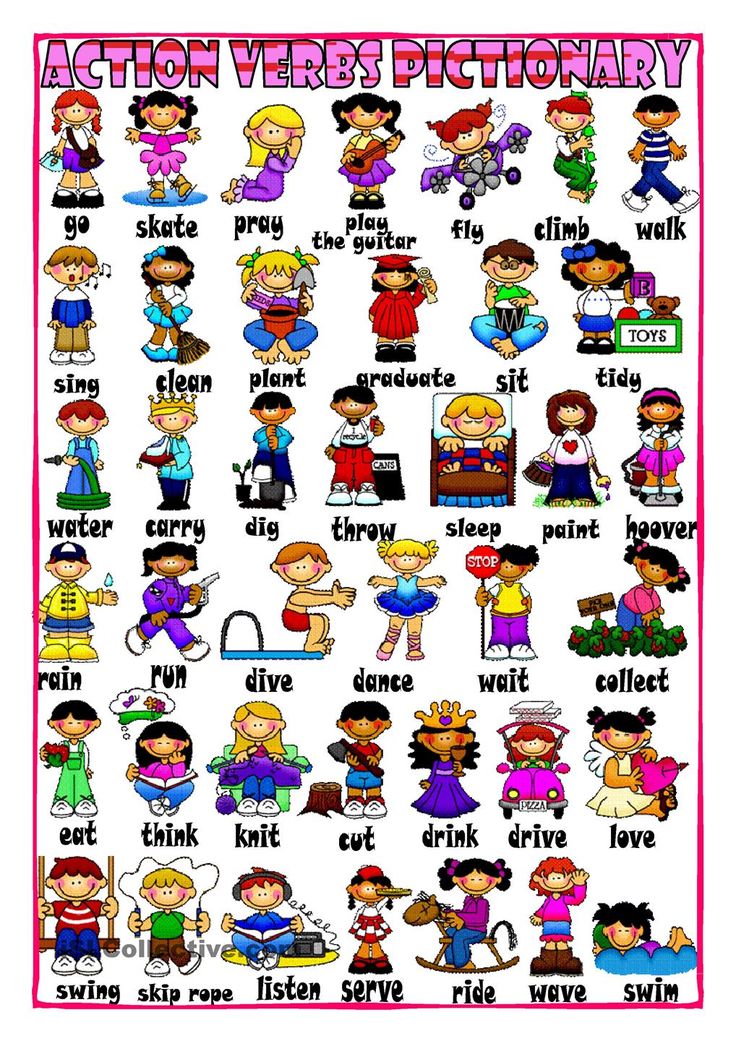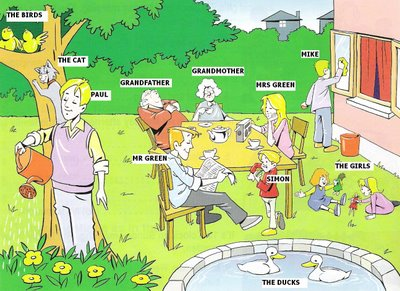Blog
Early Verb Acquisition and What to Expect Before Kindergarten
What is a Verb?
A verb is a word that shows:
- Action: What the person, place, or thing (noun) is doing
- Examples: jump, swim, dance, hike

- State of being
- Examples: is, are, am, appear, become
What Types of Verbs Should You Expect Your Preschooler to Have before Kindergarten?
1. Present Progressive:
- Indicates an activity that is currently or was recently in progress. The present progressive adds an -ing to the end of verbs. Remember though, it can only be used with action verbs!
- Age of Mastery: 19-28 months old
- Examples: eating, jumping, dancing, skating
- Activities to Promote Acquisition:
- Charades: Act out an action (jumping, swimming, dancing, brushing teeth, sleeping), and ask, “What am I doing?” Have your child then act out an action and you guess! Make it fun by giving your child a token/star/block each time he/she guesses the right action!
- Through Play: While playing with your child, comment on what he/she is doing (i.e., while playing with a dollhouse, “Oh the mommy is cooking dinner and the baby is sleeping.)
- Picture Cards with Scenes: Use a scene picture card (see below) and have your child describe what each character is doing.

- Watching television: While your child is watching his/her favorite television show, comment on the actions of the characters (i.e. “Look! Dora is running!”)
2. Irregular Past-Tense:
- An action or state of being that happened in the past. Unlike regular past-tense verbs, irregular past-tense verbs do not use the -ed ending.
- Age of Mastery:
- 3-4 years old: hit, hurt, went
- 4 -5 years old: saw, gave, ate
- Activities to Promote Acquisition:
- Always teach functional irregular verbs first (see above age of acquisition)
- Model: At night, tell your child about your day. (i.e., “I went to the bagel store and ate an egg sandwich. What did you eat?”)
- During Play: Comment on what happened while you and your child play (i.e., while your child is playing with a toy kitchen, “Oh! You made cookies? Can I have one?” or “Can I have a cookie now? I already ate my dinner and drank all my juice!”)
- Games: If your child is school-age, you can take a ball (basketball, soccer ball, etc.) and a worksheet with irregular verbs. You can call out a verb, throw the ball to your child, and he/she can call out the irregular form of that verb. If he/she gets it correct, he/she can try to get the basketball into the hoop or kick the soccer ball. Make it fun!
3. The Verb “to be”:
- Can be used as the main verb (“I am sick”), or helping verb (“She is singing”). The different forms include: am, is, are, was, and were. Additionally, forms of the verb “to be” are contractible (“I’m going” or “Mommy’s tall”)
- Age of Mastery:
- Main verb: 27-39 months old
- Helping verb: 4 years of age
- Contractible: 4 years of age or later
- Activities to Promote Acquisition:
- During Play and Conversation: modeling is important! (i.e., “I am so hungry! Are you hungry? I was not before but now I am! I am going to make dinner! What do you want to eat?”)
- Picture Books: Using literature is a great way to promote vocabulary growth (including verbs!) While reading, point out what the characters in the story are doing and comment on what they did previously (“Oh look! The hungry caterpillar is eating an apple! He was eating an orange.”)
- Games: You can also do charades for this verb type! Using picture cards of various animals, pick one out and act out the animal. The child will have to guess using the verb “to be” (i.e. “You are a dog!” “No! I am a cat!)
4. Regular Past Tense -ed
- Using a verb to describe something that already happened. It is important to note that this is overgeneralized to previously learned irregular past-tense verbs (i.e., “eated” and “falled”)
- Examples: jumped, danced, hiked
- Age of Mastery: 26-48 months old
- Activities to Promote Acquisition:
- Games: Simon Says (“Simon says touch your nose — “Great! You listened! You touched your nose! — “Simon says jump up and down” — “Great! You listened! You jumped up and down.” Let the child be Simon after you have modeled and have them comment on what you or did not do) and Red light Green light (“Oh! You moved!”)
- Picture Books: Comment on what a character has done in the book, or find a book that can allow repetitive use of a verb/verbs, such as “The Mitten” by Jan Brett. You can model for the child, “Oh look! A rabbit climbed into the mitten, a skunk crawled into the mitten, and a bear climbed into the mitten!”
- Modeling in Play/Conversation: comment on what the child did after playtime/an activity/the day is finished! (i.e., “Oh wow! We washed the car, played a game, and cooked dinner!”)

– Amanda Hammer, MA, CF-SLP, TSSLD
Resources:
- Owens, R. E. (2008). Language development: An Introduction (Seventh ed.). Boston, MA: Pearson Education.
- Paul, R., & Norbury, C. (2012). Language disorders: From infancy through adolescence: listening, speaking, reading, writing, and communicating (Fourth ed.). St. Louis, MO: Elsevier.




